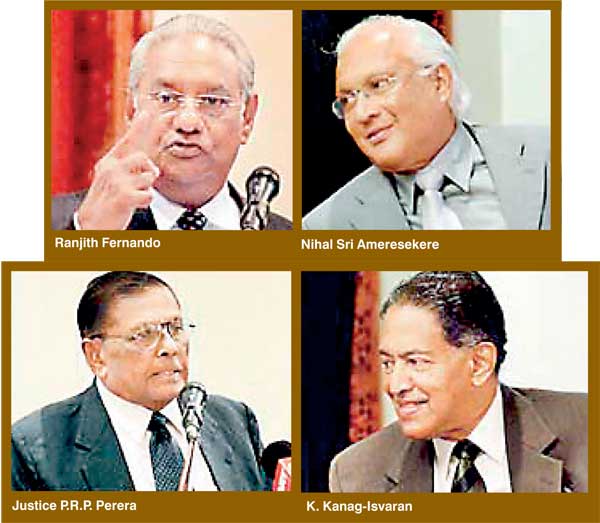Reply To:
Name - Reply Comment

A very timely seminar on the ‘Debacle of Finance Companies’ was held recently at The Kingsbury. Human Rights Commission Chairman Justice P.R.P. Perera chaired, whilst presentations were made by banker, lawyer cum accountant, Ranjith Fernando, President’s Counsel K. Kanag-Isvaran and professional consultant and public interest activist, Nihal Sri Ameresekere.
Justice P.R.P. Perera, who had chaired the Presidential Commission on Failed Finance Companies, stressed on the gravity of the present predicament. He emphasized that had the recommendations made by his commission been given effect to, then the present predicament would not have arisen.
He also raised the concerns of human rights, stating that when finance companies fail, that depositors, whose sole life savings have been swindled, had even committed suicide.
Ranjith Fernando, with his wide experience in banking, presenting relevant facts and data questioned why the commercial banks were permitted to enter into the finance and leasing business, which were secondary market operations.
Commercial banks, he pointed out, had a lower rate of cost of capital, not only in view of the lower rates of interest on deposits but due to the abundance of interest-free capital in current accounts.
Commercial banks should be financing the industrial and business sectors, whilst lending to the finance and leasing companies to do micro business. He posed the question as to why common impracticable standards of asset values, etc. are being applied across the board to all finance companies, without taking into account each case separately.
He highlighted that several small finance companies were conducting their businesses profitably focusing on personalized and localized clientele. He also raised the question as to how profitable finance companies or banks could be compelled to merge with mismanaged loss-making finance companies to the detriment of such profitable financial institutions.
Defining the role of the Central Bank and Monetary Board in terms of the Monetary Law, experienced President’s Counsel K. Kanag-Isvaran raised cogent issues on the due judicial process being usurped by the Monetary Board.
He highlighted that for the first time the word ‘public interest’ had been used in the new Finance Business Act No. 42 of 2011, raising the question as to whether the provisions of the act had taken public interest and the interest of the depositors, as the foremost concerns.
K. Kanag-Isvaran went on to cite several instances where the Act No. 42 of 2011 had denied access to justice in practical terms, without due process. He pointed out that though the members of the Monetary Board were liable to be sued, such action could be instituted only with the permission of the Attorney General, which approval would never come forth.
In response to the issue raised by Nihal Sri Ameresekere that Section 58(2) of the Act No. 42 of 2011 had even amended the constitution of the republic by transferring the power of Court of Appeal to the Supreme Court, Kanag-Isvaran, with Justice P.R.P. Perera concurring pronounced that such simply could not have been done.
Nihal Sri Ameresekere displaying a chart exposed the global scenario of scandals in reputed international financial institutions. He stressed that unlike other businesses, finance institutions were custodians of people’s monies and were thus expected to manage in trust.
He pointed out that well-known financial institutions have had an amazing record of dishonest and outright criminal behaviour. He cited Section 31(6)(j), where shareholders of mismanaged failed finance companies had to be paid perceived market values of their shares.
He cited an instance where a closely held finance company with less than Rs.350 million net assets, has had market valuations of 14,000 million and 33,000 million, in terms of share prices of transactions effected cautioning the Central Bank citing the instance of National Savings Bank and The Finance deal, which was annulled due to public hue and cry.
He questioned as to why in terms of Section 12(n) of the Act No. 42 of 2011 individual and related party shareholdings in finance companies had not been restricted, as in the case of banks.
He also cited Section 21(1)(e)(i) of Act No. 42 of 2011 whereby persons being subject to investigations or inquiry by anybody were disqualified from being directors of finance companies. To enforce such provision, inquiries would have to be made from all relevant regulatory bodies and questioned as to whether even a CRIB Report was obtained when considering a ‘fit and proper’ test for directors.
In response to a query from the participants as to how best finance companies could be monitored, Ameresekere suggested the following format for periodic simple information which even a layman could understand.
Ranjith Fernando pointed out that secrecy of information were limited to the particulars of an individual and not to such total data, which should be publicly disseminated. Ameresekere stressed that this would be a self-regulatory mechanism, easing the burden of the Central Bank.